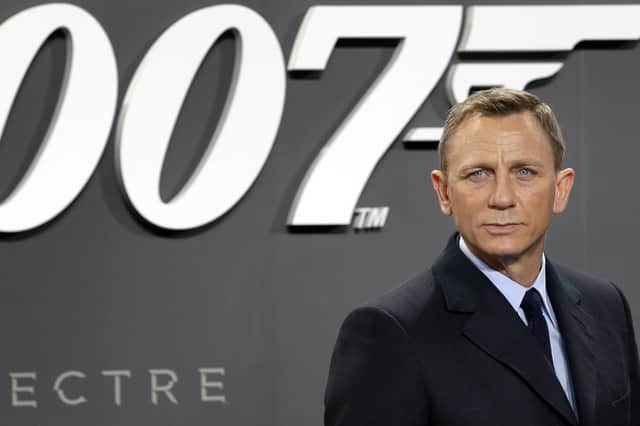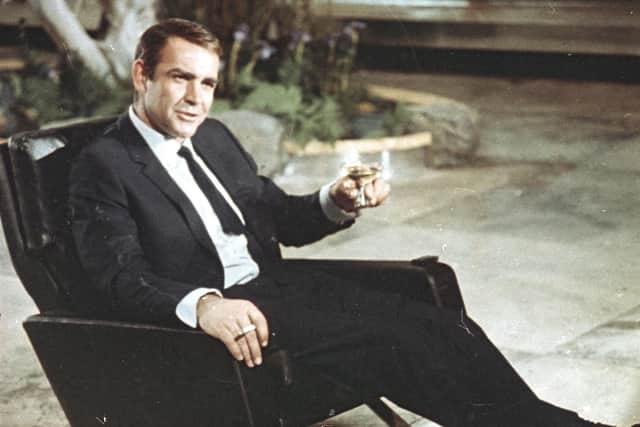Scottish independence: Why James Bond's most incredible mission just might be saving the Union – Alastair Stewart


The problem most have when it comes to Scottish independence (with one recent poll putting support at a record 58 per cent) is there's a cultural Rubicon that only appears whenever Scots get within half an inch of separation.
Most might generally agree that devolution is an anchored fact of life. Many argue that Scotland should have more or total control over its destiny.
Advertisement
Hide AdAdvertisement
Hide AdThe SNP's record electoral returns at Holyrood and Westminster seem to suggest a forward march towards breaking up the Union. But push a little further and when there was a referendum, 55 per cent of people didn't want it.
Support for the SNP and independence are two intertwined but very different concepts. The SNP will more than likely take a majority at the 2021 Holyrood elections. They're now a generational government. But if a second independence referendum takes place, that same indy-brinkmanship will give the same result.
The arts help define Britishness
There's a massive, complex and unquantifiable attachment to Britishness that no one has ever been able to define adequately. 'Project Fear' is far too derogatory an explanation for it. Britishness isn't fear; it's a collective cultural knee-jerk whenever the United Kingdom is threatened with foreign attack, catastrophe or disintegration.


Unlike our American cousins, it's not in flag-waving or anthems. If anything, Britishness is more pop culture and the arts than political institutions. Our system looks regal with a monarch at the head, but its political components are easily replaceable and adaptable (unlike US presidents).
British cross-pollination is impossible to demarcate. It's in our music, our films, our books and language. James Bond is an Englishman. Or he was. And then a young Sean Connery took on the role in Dr No in 1962 and global history was made. Ian Fleming was so impressed he made his quintessential English hero half-Scottish and half-Swiss in his next book, On Her Majesty's Secret Service (1964).
To pre-empt the detractors, no, I'm not suggesting Harry Potter, our sports teams or Britain's Got Talent are enough to ignore the constitutional problems of the UK. But the cultural ties that bind are so abundant that they've slipped into what academics call banal nationalism – they're there, but we're only aware of them if someone points them out or threatens to break them up.
Correcting howlers
There's a sadness that creeps into play across the whole United Kingdom – as it did in 2014 – when we think we'll lose our mismatched and confusing country. It's not saccharine or misplaced patriotism; culture is an impossibly messy thing to pull apart, and it's foolish to underestimate how losing 'Britishness' will determine Indyref2.
But British culture is also a massive Achilles heel on the global stage. The world presumes and often insists on calling our half-Scot spy “English". The Queen of England is another Hollywood and TV trope that does the rounds. The Prime Minister is the 'English leader'. It's 'England' that sits on the UN security council. The list is endless. And none of it is factually untrue.
Advertisement
Hide AdAdvertisement
Hide AdIt just doesn't work both ways. England is the bigger beast in this Union and has been eponymous with Britain for a long time. At home, we may feel Scottish; when threatened, we might be British, but the world tends to acknowledge overtly Scottish things while conflating Britain's political institutions with being 'English'.
And it isn't enjoyable. The straw that will break the camel's back is in the terminology of the day, thanks to the onslaught of social media. It's exhausting correcting the howlers mentioned above as it is maddening that every major organisation and art institution in Scotland has to be prefixed with 'Scottish' to differentiate it.
English nationalism
Scotland is globally recognisable, but it has very few of the economic or political levers to support the very things we're now famous for in the world. And yet in other parts of the UK, there's a feeling we have too much political sway.
Writing in The Spectator, Toby Young suggests the current situation is making him an "English nationalist”. And who can blame him – he's suffering the problem in reverse: English culture isn't called English but British, and England's political institutions are heavily diluted with devolved representatives influencing English issues. Brexit was never about Europe – it was about reasserting Englishness in political systems that have been affected by the “West Lothian question” and perceived European dominance.
The misalignment is deeply troubling for those who hold out hope that there is a way to fix the situation. Federalism is a tired subject even though it has never been truly tested in Britain. It is hard to see how this would not, for a while, be the missing evolutionary piece on the road to independence if all else failed. Instead of a radical jump, some last, great push towards bettering the constitutional and cultural situation is warranted.
Scotland must have the freedom to make a name for itself politically, to realign with global cultural recognition but stay within the family of the United Kingdom. Being sad that England's greatest spy, played by Scotland's greatest son, would no longer be British is a good starting gun.
But, to borrow from our revolutionary cousins, "We the People" must demand it for no one else but ourselves. It's also worth remembering the next part after that famed statement is "in Order to form a more perfect Union”.
A message from the Editor:
Thank you for reading this article. We're more reliant on your support than ever as the shift in consumer habits brought about by coronavirus impacts our advertisers.
If you haven't already, please consider supporting our trusted, fact-checked journalism by taking out a digital subscription.
Comments
Want to join the conversation? Please or to comment on this article.